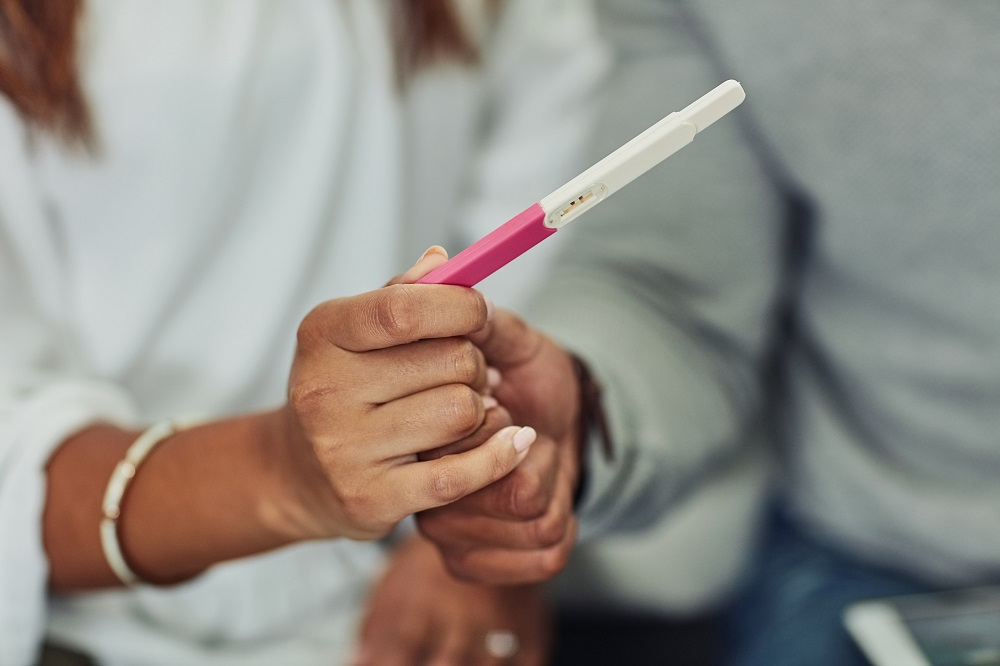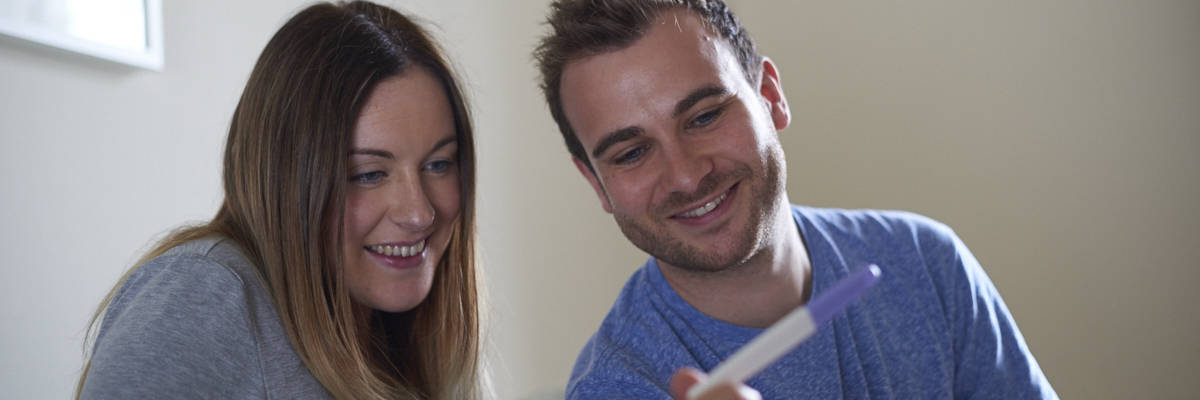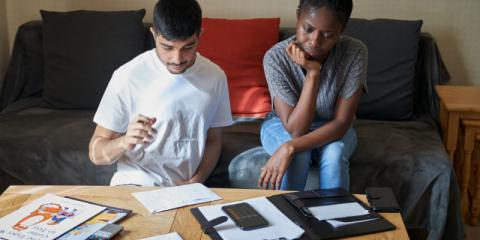Deciding to start a family, or grow the family you already have, is exciting – but trying for a baby can be a big change in your life, especially if, up until now, you’ve been making sure you don’t get pregnant! It may take you a while to conceive, or it may happen as soon as you start trying – so it’s a good idea to be as prepared as you can.
Here are some things for parents-to-be to think about that can help you improve your fertility, as well as your health and the health of any future pregnancy.
Planning a pregnancy now or in the future?
If you want to try for a baby you’ll find lots of information here and on the baby charity Tommy’s planning for pregnancy hub. This has lots of information covering a range of topics to help you plan for pregnancy.
You can also find out more on the NHS Inform website.
If you’ve decided that now is not the right time for you, you can find out more about contraception on the NHS Inform website.
Top tips if you're planning a pregnancy
Tip #1: Check out Tommy's pregnancy quiz
If you’re starting your pregnancy journey, Tommy’s have a really useful pregnancy quiz, which asks you questions about your situation and then gives you personalised guidance to help.
Tip #2: Stop smoking
If you currently smoke, giving up before you start trying for a baby is one of the best things you and your partner can do to improve your chances of getting pregnant, your health and the health of any future pregnancy.
Stopping smoking isn’t easy we know, but you can get lots of advice and support through Quit Your Way from the NHS.
You can find out more about smoking and pregnancy on the Tommy’s website.
Tip #3: Go sober
To improve your chances of getting pregnant, it’s a good idea for you, and your partner, to give up the booze as well as any recreational drugs.
You may not know you’re pregnant for the first few weeks after conceiving (getting pregnant) and so the safest thing to do is not drink any alcohol or take any recreational drugs while you’re trying for a baby.
You can find out more about how alcohol and drugs can affect pregnancy on the Tommy’s website.
If you’re finding it hard to stop, Drinkaware offers a free, confidential helpline, and also lists other support lines you can call.
If you regularly use drugs and would like to stop, it’s important to withdraw in the right way, usually as part of a drug treatment programme. You should reach out to your GP, who can discuss your drug use with you and help find the right treatment for you.
If you don’t feel comfortable talking to your GP, you can reach out to your local drug and alcohol service yourself. These services are private and confidential, and are there to help you, without judgement. You can find a drug and alcohol support service in your area here.
Tip #4: If you're on any medication, don't stop taking it
If you have a physical or mental health condition that means you take prescribed medication – don’t stop! Talk to your GP or healthcare professional first. They will explain the safest options for you and the pregnancy you’re planning.
You can find out more about planning a pregnancy if you have a physical health condition and mental health condition here.
Support is also available from the Scottish Obstetric Cardiology Network (SOCN) for women with a heart condition who are thinking about pregnancy, or who are pregnant. You can find out more about pregnancy with a heart condition on the SOCN website.
Tip #5: Start taking folic acid tablets
Folic acid (vitamin B9) supplementation is important in the very early stages of pregnancy and before you even become pregnant.
That is why if you’re planning on having a baby, it’s recommended you take folic acid from 3 months before becoming pregnant.
If you’ve already started trying for a baby, don’t worry – just begin taking the folic acid as soon as you can. If you find you are already pregnant, then try to start taking folic acid daily as soon as possible up to week 12 of pregnancy.
You can buy folic acid in your local supermarket or pharmacy. There's no need to take a multi-vitamin – it's usually cheaper to buy folic acid separately. Your local pharmacist will be happy to help you and offer advice on buying and taking over the counter medicines. You can also speak privately to your pharmacist about your pre-pregnancy care.
Once you know you are pregnancy you can get Healthy Start vitamins from your midwife, which contains the right dose of folic acid.
You can find out more about folic acid, and the other vitamins and minerals which are important during pregnancy on NHS Inform.
Tip #6: Take good care of your mental health

Our mental health is as important as our physical health – but it can be easy to overlook it when there is so much going on. It’s natural to feel a lot of different emotions when trying for a baby. However, there are lots of things that can help with this, like:
- seeing friends and family
- talking to someone you trust about your feelings
- keeping active
- eating healthily
- getting plenty of sleep
- trying mindful activities like breathing exercises and yoga.
There are lots of resources available on NHS Inform to help you, and your partner, manage your feelings.
If you’re feeling sad, down, worried or anxious, it’s a good idea to talk to your partner, friends or family about how you’re feeling. If these feelings don’t go away, contact your doctor. They can talk to you about treatments if you have symptoms that you feel are interfering with your day-to-day life.
Tip #7: Talk to your doctor if you have a pre-existing or previous mental health condition
If you have or had a mental health problem in the past, and you’re planning to have a baby, you should talk to your doctor before you try to become pregnant. There’s lots of support out there, so this gives you a chance to find out more about what’s available in your area.
When you’re pregnant it’s best for your doctor or midwife to know your full medical history in case anything comes up during or after your pregnancy. Together, they can help you manage your pregnancy and your mental health.
You can find lots more information on planning a pregnancy with a mental health condition on the Tommy’s website.
Tip #8: Find out when you're most fertile
Having regular, unprotected sex will give you the best chance of getting pregnant but knowing when you are most fertile (most likely to get pregnant) also helps. You can find an ovulation calculator and learn more about how to boost your chances of getting pregnant on the Tommy’s website.
Some people get pregnant very quickly, so it’s important to plan ahead and be prepared for pregnancy before you stop using contraception.
Whatever happens, don’t forget it’s important for you and your partner to try to keep sex enjoyable, as some people find it can take longer than others to get pregnant .
Tip #9: Have a look at your finances
Starting a family can have a big impact on your finances too, but planning ahead can really help to reduce stress and money worries. And the good news is, there are several grants and benefits you may be able to claim when you’re pregnant or have a new baby. Our pages on financial support and benefits for families and tips for saving money before your baby arrives can help you plan in advance.
Tips for dads-to-be and partners-to-be
There are lots of things your partner can do to help improve your chances of getting pregnant, including eating healthily, quitting smoking, drinking less alcohol and even avoiding hot baths!
There is help and advice just for them on the Tommy’s website.
How will I know when I'm pregnant?
The most obvious sign that you might be pregnant is missing a period. But there are other signs. You can find out more about these signs and what to do next on the Tommy’s website.
If you have a health condition that affects your period (like endometriosis or PCOS), your periods are very irregular or you don’t get periods at all, it’s best to speak to your GP for information and advice.
What if it doesn't happen?
If you have been having regular unprotected sex and are concerned about the time that it is taking to get pregnant, please speak to your GP, who can either provide reassurance or refer you for fertility tests.
Having a baby if you’re single or LGBT+
If getting pregnant by having sex isn’t an option for you, there are still ways you can become a parent, including:
- assisted conception (for example, IVF)
- surrogacy
- adoption or fostering
- co-parenting.
In Scotland, same-sex couples can get IVF on the NHS, provided they meet certain criteria. However, at the moment single people cannot have NHS IVF treatment. Your GP will be able to talk you through your options.
You can find out more about adoption, fostering and surrogacy on the MyGov.scot website. Trans and non-binary parents can find information on the HFEA (Human Fertility and Embryology Authority) website.
Planning a pregnancy after a loss
If you’ve experienced a miscarriage or stillbirth, our hearts go out to you. If you’ve decided to try for a baby again, you may well feel all kinds of emotions, and it may help to talk to someone about your feelings.
There are also a number of organisations which offer further help, advice and support including:
- Tommy’s offer advice and support, including a Parenting after loss Facebook support group. They have also developed a personalised support tool for anyone planning a pregnancy after a loss to help you get any additional information or support you might need.
- Sands supports anyone who has been affected by the death of a baby before, during or shortly after birth.
- The Miscarriage Association offers information and support to anyone affected by miscarriage.
- Antenatal Results and Choices (ARC) offers support to anyone worried about an antenatal result.
- Held In Our Hearts provide baby loss counselling and support.
 Activities & Play
Activities & Play Behaviour
Behaviour Childcare
Childcare Development & Growing Up
Development & Growing Up Family, Friends & Relationships
Family, Friends & Relationships Feeding Your Baby
Feeding Your Baby Food & Eating
Food & Eating Health & Safety
Health & Safety Mental Health & Wellbeing
Mental Health & Wellbeing Money & Work
Money & Work Online Behaviour & Safety
Online Behaviour & Safety Pregnancy & First Days
Pregnancy & First Days School & Education
School & Education Sleep
Sleep









 Mental Health & Wellbeing
Mental Health & Wellbeing
 Money & Work
Money & Work